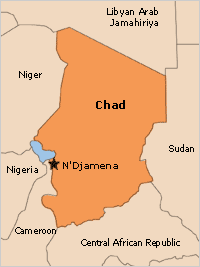Chad's oil creates more problems than it solves
In just under 30 months, Chad has become a typical oil-producing, African country, with allegations of rampant corruption, an ongoing fight with the World Bank and a burgeoning rebellion along the eastern border while the population remains dirt poor.

Chad was praised by many as having a model oil program when the central African country began exporting oil in October 2003. Two-thirds of revenues went to projects designed to improve living standards in one of the world's poorest countries.
The oil revenue law, which parliament passed in 1999, further required that 10 percent of oil proceeds go to a savings fund to be used when Chad's oil reserves are exhausted. It also set up a board of government and nongovernment officials to independently verify where the money went.
These safeguards were supposed to help Chad improve the income, life expectancy and education of its 8.8 million people. Instead, this country of 8 million moved down eight positions to rank 173 out of 177 countries last year on the U.N.'s human development index.
"Impediments to growth include the country's inadequate physical infrastructure and transportation networks, expensive and unreliable energy supply, weak governance, insecurity, limited access to financial services, and an unskilled labor force," the International Monetary Fund said in a March 2005 report, its most recent public analysis of the Chadian economy.
The drop comes even though the Exxon Mobil-led consortium exported 133.2 million barrels of oil from Chad between October 2003 and December 2005, according to the World Bank.
Chad, which receives a 12.5 percent royalty on each barrel exported, earned a net total of US$307 million (about Ђ 250 million), the bank said.
The paradox extends to infrastructure. Residents of the capital, N'djamena, suffer daily power outages and look with envy toward the oil-fields in southern Chad, which can generate 120 megawatts a year while N'djamena currently needs 30 megawatts.
The oil-fields have that huge generating capacity "to meet growing operational needs," said Susan Reeves, a spokeswoman for Exxon Mobil.
She explained that Chad does not have a national grid and each city uses local generators to provide and distribute electricity, so it is currently impossible to share the power, reports the AP.
I.L.
Subscribe to Pravda.Ru Telegram channel, Facebook, RSS!


